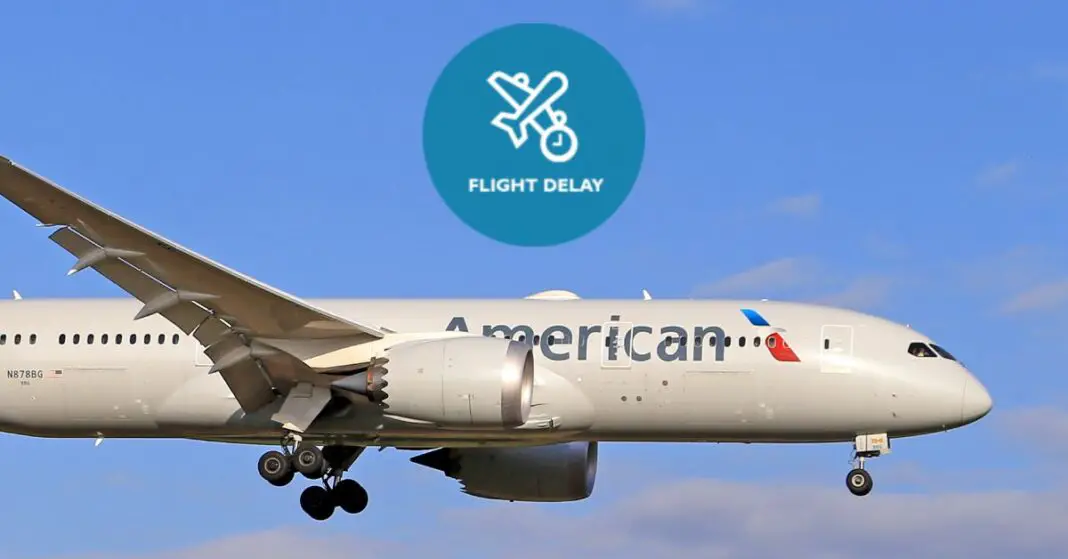Delays can be a common problem that makes things difficult for passengers. Airlines need to handle compensation for delays well. American Airlines is doing a good job in this area. They follow their compensation rules and navigate through the complex regulations.
This blog looks into the details of how American Airlines handles compensation for delays. It also checks the related laws, explores new practices, and talks about how these policies affect the airline’s money situation.
Table of Contents
American Airlines Delay Compensation Policies
American Airlines, a global aviation behemoth, mirrors the industry’s best-in-practice when it comes down to handling flight delays. To those unaware, the airline company follows a distinct policy set for mitigating any inconvenience caused due to any delayed or canceled flights.
However, the exact scope of American Airlines’ delay compensation policy is based on several factors. It’s important to grasp these specific terms and conditions to leverage them appropriately and to ensure their benefits don’t go unclaimed.
Flight delays and cancellations are typically contingent on factors beyond an airline’s control such as weather, air traffic control issues, or safety inspections. Still, under the US Department of Transportation regulations, American Airlines aims to make the ordeal less stressful for its patrons, nonetheless.
If your flight is delayed for more than two hours, or if it is canceled altogether, the company provides amenities to alleviate the inconvenience, which could range from meal vouchers to — in rare instances — hotel accommodations for overnight delays.
Yet, it should be noted that direct monetary compensation for delays is not granted by airlines in the United States, including American Airlines. This is unlike the norm in the European Union where passengers can receive up to 600 Euros for flight delays.
However, American Airlines does put heavy emphasis on customer satisfaction and will often go above and beyond to incentivize and retain their consumers. Thus, the precise scope of American Airlines’ delay compensation policy, while rooted in specific guidelines, is usually both flexible and empathetic to its customer needs.
Does American Airlines compensate you for delayed flights?
Rebooking is provided for delays under 4 hours. Delays surpassing 4 hours result in compensation, such as vouchers or refunds, based on whether passengers accept alternative flights or experience significant changes to arrival times due to missed connections.
How much does your flight have to be delayed to get compensation?
The eligibility for compensation due to a delayed flight depends on factors such as the destination, airline, and the reason for the delay. In Europe, delays of 3 hours or more on EU flights typically qualify passengers for compensation.
In the United States, the criteria are more variable, often requiring delays exceeding 4 hours, with individual airlines having their policies in place.
How much compensation should I receive for airline delays?
Determining the compensation for an airline delay involves considering various factors:
- Regulations:
- EU: Fixed compensation amounts based on flight distance under EU Regulation 261/2004.
- €250 for flights < 1,500 km.
- €400 for flights between 1,500 and 3,500 km.
- €600 for flights > 3,500 km.
- US: No federal law mandates compensation for domestic delays; airline policies vary. Some, like American, may offer voluntary compensation for delays over 4 hours.
- Delay Duration:
- Longer delays generally result in higher compensation; EU regulations specify higher amounts for delays exceeding 5 hours.
- Reason for Delay:
- Delays due to airline faults lead to higher compensation compared to “extraordinary circumstances” like weather.
- Ticket Price:
- Some airlines calculate compensation based on a percentage of the ticket price, potentially resulting in higher compensation for more expensive tickets.
- Additional Expenses:
- Reimbursement for reasonable expenses incurred due to missed connections or overnight stays may be possible.
In summary, determining the exact compensation involves evaluating your situation against relevant regulations and the airline’s specific policy.
How do I know if I am eligible for flight delay compensation?
Determining eligibility for flight delay compensation hinges on three key factors: your destination, the airline you chose, and the reason for the delay. For EU flights delayed by 3+ hours, fixed compensation is guaranteed, irrespective of the airline.
In the US, compensation policies vary among airlines, with some like American providing compensation for delays exceeding 4 hours. Delays caused by the airline typically qualify, while those due to weather or security issues may not. To assess eligibility and claim rightful compensation, check the airline’s policy and utilize online tools for research!
Regulatory Framework Governing Air Travel Compensation
Evolving around the conversation of air travel compensation, you’ll discover an array of ancillary rules and regulations that specifically link to American Airlines. One key point of focus is the contingency plan for lengthy tarmac delays that all U.S.-based airlines are legally obligated to have in place.
American Airlines’ contingency clearly states that, in the event of a delay, the aircraft won’t remain on the tarmac for more than three hours for domestic flights or four hours for international flights (with exceptions for safety, security, or air traffic control-related reasons). Moreover, the airline is bound to provide adequate food and water, working lavatories, and necessary medical attention to passengers after two hours of delay.
Furthermore, American Airlines operates under the airline passenger rights outlined in the contract of carriage — a legally binding document that outlines the responsibilities and liabilities of an airline.
Should American Airlines experience a schedule change, a route change, or a flight cancellation that is within their control, and not caused by “acts of God” or third parties, they are expected to provide a level of service as outlined in Rule 240 of the contract of carriage. This rule usually encompasses rebooking on alternate flights, providing food or hotel accommodations, and in some instances, endorsing the ticket to another airline.
Unlike Europe’s EU261 legislation which mandates airlines to offer monetary compensation for significant delays (with specific exemptions), no such federal law exists in the United States.
However, the Department of Transportation (DOT) requires U.S. airlines to provide passengers with a full refund if a flight is canceled, substantially delayed, or if the airline fails to operate on schedule. This distinctive legislation showcases the divergence between American and European aviation policy, amplifying the contextual intricacies an entrepreneur operating within these markets would need to master.





